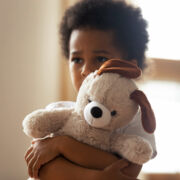
How Loss Shows Up
Understanding Loss
Loss and Big Feelings
Loss can involve grief and we often think of grief as synonymous with sadness. Grief is not a single emotion; it can involve any and/or all of the emotions and often involves more than one feeling at once. It is possible and even common to be able to hold feelings of gratitude and relief alongside feelings of sadness and frustration. The ability to value your own feelings as well as those of others is critical when it comes to supporting anyone through loss.
Grief isn't one feeling. It's all the feelings.
Video features the following students from the Thomas Jefferson Arts Academy and members of the Elizabeth Youth Theater Ensemble: Harold Gomes, Renee Gomez, Natalia Ocampo, Mary Kate Severe, and Shamar Thomas.
The Effects of Loss and Grief
Big feelings can impact us physically as well as emotionally. It’s not uncommon for a person to experience the following physical and cognitive changes in response to loss:
Physical
- Aches and pains
- Changes in appetite
- Changes in sleep patterns
- Changes in weight
- Digestion issues
- Headaches
- Inflammation
- Migraines
Cognitive
- Altered perception of time
- Difficulty concentrating
- Difficulty making decisions
- Difficulty processing information
- Forgetfulness
Behavioral
- Distractibility
- Emotional outbursts
- Hyperactivity
- Loss of interest/participation
- Perfectionism
- Regression
- Temper tantrums
“It would hurt.”
Asia Khan’s mom died in a car accident when Asia was 14. In this video from Speaking Grief, Asia describes how her grief affected her physically.
Is it a Behavior Problem or is it Grief?
When we're observing a child's physical, cognitive, and behavior changes, we're considering things that are different pre/post - atypical for the child. It's not uncommon for normal manifestations of children's grief to be mistaken for ADHD or behavioral problems.
If you observe a child or teen experiencing these behaviors, it might be time to get curious. It might be that they are navigating loss.
Sharing What You Know
Understanding the many ways grief manifests allows you to help the kids and teens in your life empathize with their grieving peers. If they share that a friend, classmate, or teammate is acting differently around a loss experience, it may be helpful to talk with them about how grief can impact behavior.




